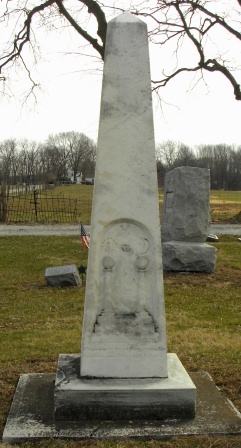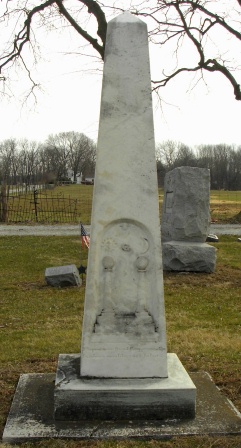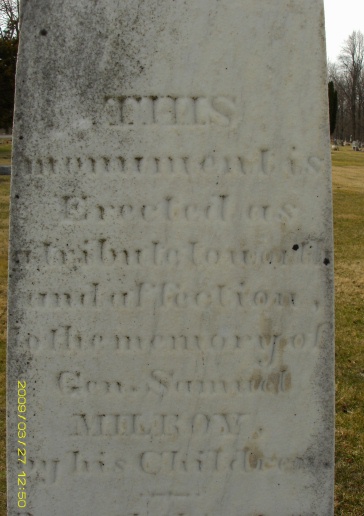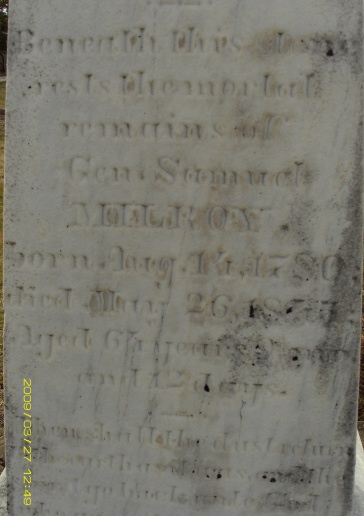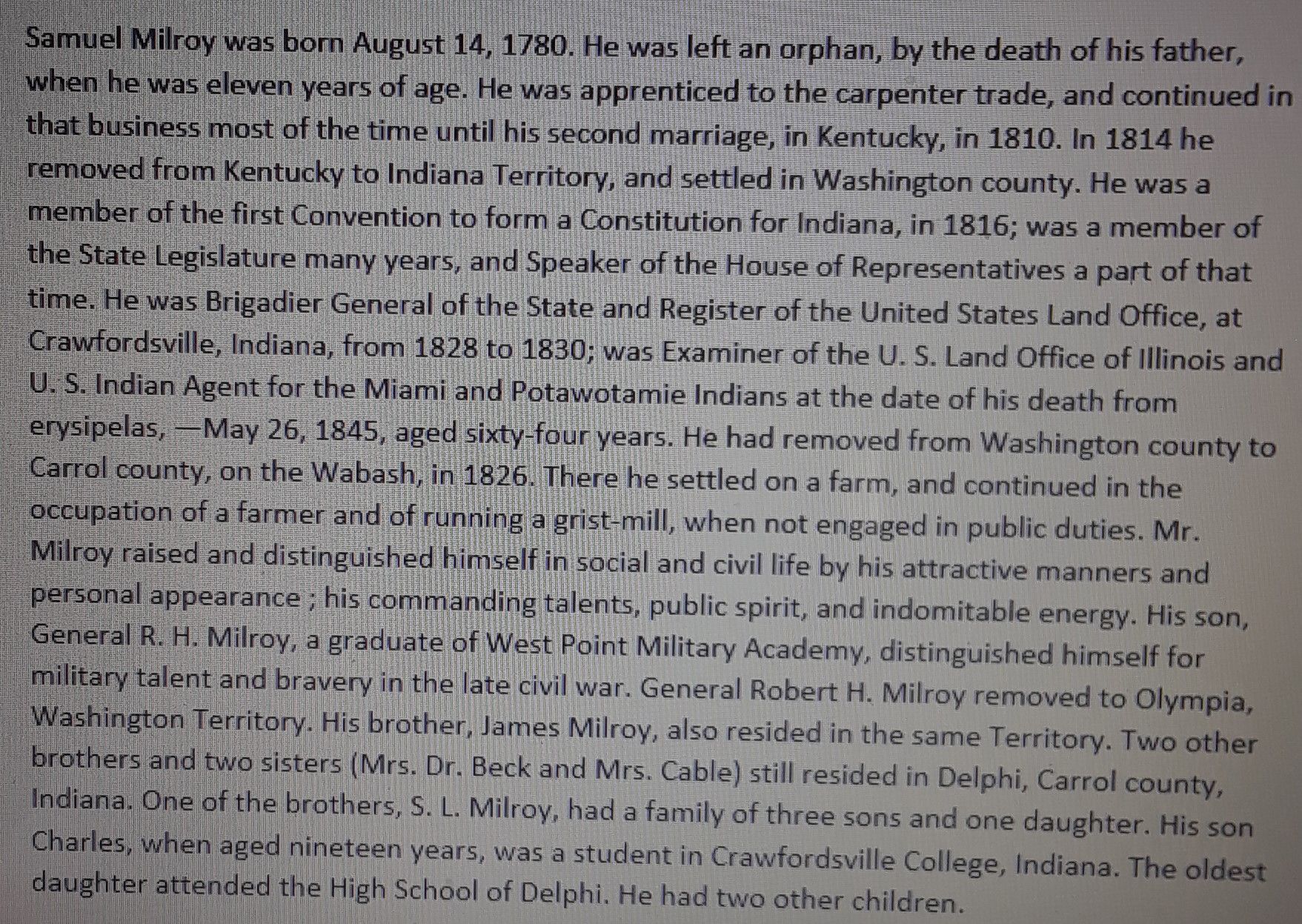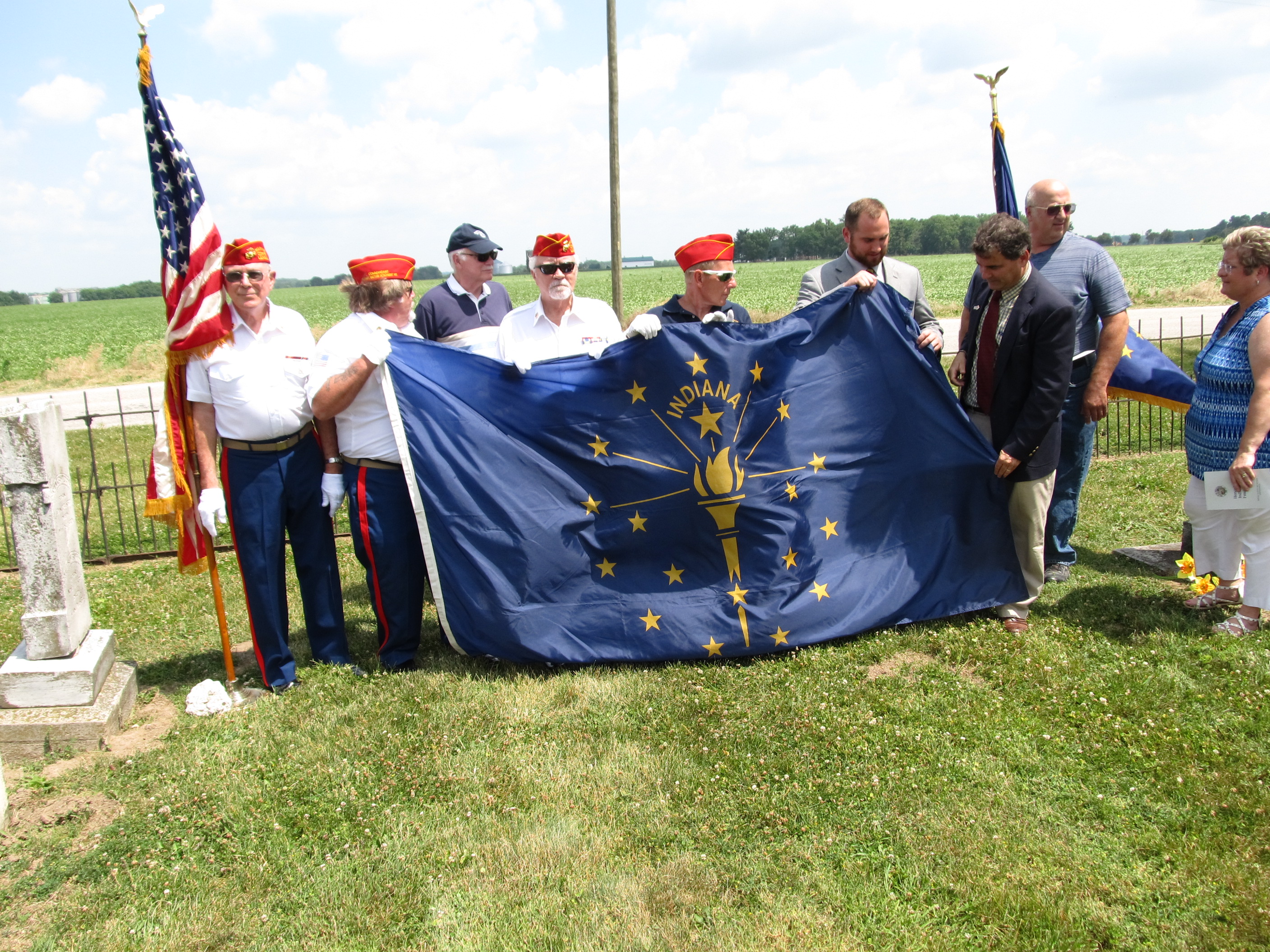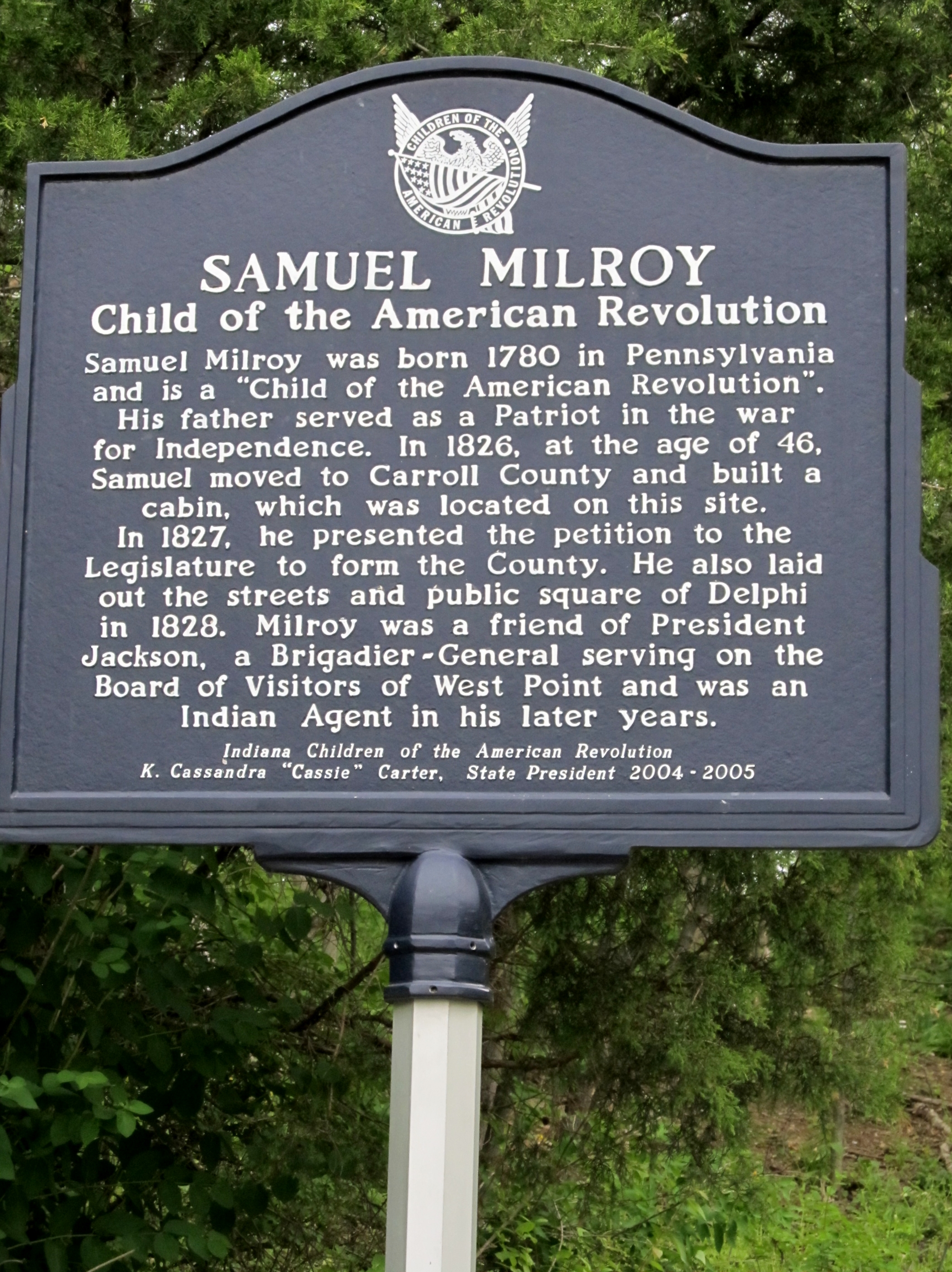GENERAL SAMUEL MILROY (TRIBUTE)
General Samuel Milroy was born on August 14, 1780 in Kishacoquila Valley, Mufflin County, Pennsylvania. His father died when he was eleven years old after which time, he was thrown upon his own resources. He served an apprenticeship to the Carpenter and Joiner's Trade, which expired in 1800. In 1801 in company with his brother John (who now resides at Greenfield in Indiana) he located near Lake Erie where land was promised to settlers upon condition of five years residence, and payment of expenses of surveying. The two Milroy's located a claim of 400 acres near where the town of Erie now stands, and after working upon it for three years, they were swindled out of their land. In 1803 he married his first wife in Mifflin County, Pennsylvania. His first wife only lived three years. In the year of 1807, the two brothers Milroy removed to Kentucky--and at the time of their arrival of their intended home in that State, they had but one dollar between them. General Milroy remained in Kentucky, but a short time--he then went to St. Louis where after working at his trade for several months, he had a long and severe spell of fever, and as soon as he was able to travel, he returned to Kentucky in 1809. In this journey he traveled on foot, both going and coming through the then Territory of Indiana and Illinois. He went to work in Nelson County, Kentucky and in 1809 purchased a tract of land; in 1810 he married to his second wife (the venerable ad excellent lady who still resides at the Milroy farm's, a mile from town). In 1813, he commanded a company of horsemen who had come out into the Indiana Territory, in pursuit of the Indians who destroyed the Pigeon Roost Settlement in Washington County. in 1814 he came out to Washington County, in this state and purchased a piece of land, erected a house and removed his family in 1815. In the year of 1816 he was elected a member of the Convention to form the Constitution of the State of Indian, which met at Corydon (the old seat of Government) on the 10th day of June of that year. It is believed that he was on the Judiciary Committee, as the original draft of the principal part of the Judiciary system of the State is still amongst his papers, and also the articles prohibiting slavery. he was commissioned a Mayor by Governor Posey in 1816; in 1817 he was commissioned a Colonel by Governor Jennings and in 1819, a Brigadier General by the same Governor. He was a member of the Legislature (either of the Senate of the House) from 1816 to 1824. In the year of 1824, he was elected as one of the Electors to cast the vote of Indiana for General Jackson. In 1822 General Milroy was chosen Speaker of the House of Representatives.
In the spring of 1826 in company with his son, Henry B. Milroy, he came to the Wabash country and put in a crop of corn in the Wild Cat Prairie, near where Dayton is now located--after which he came up to the Wabash and on the 27th day of May 1826, he purchased the 80 acres of land on which the old house was located at the west end of the Milroy land--the same spring he built the old house, cleared and fenced a patch and planted it in potatoes and turnips, the produce of which, to which were added the luxuries of hominy and pork, composed the bill of fare for the family through the winder of 1826-27--the family being removed to the home aforesaid in the fall of 1826. The General was appointed one of the Commissioners to locate the county seat of Tippecanoe and attended to that duty in the same fall. In the winter of 1817, he proceeded to Indianapolis with the petition for the formation of Carroll County, and was the author of the original bill (which is not among the papers) for its organization; he also suggested its name. Two of the five Commissioners appointed to locate the county seat of Carroll County, Bryant and son, stand at the house of the General while engaged in that business. The General accompanied the commissioners in their examination and it was principally through his influence and management, that Delphi was located where it is, and received the liberal donation of 100 acres from William Wilton, the proprietor. The name "Delphi" he handed to the Commissioners in a list, among several other names for them to select from. After the location of the County seat, he surveyed the whole original town plat as it is presently recorded. He was appointed the first agent to sell the lots and after advertising in the "Salem Annotator," and "Terre Haute Register" (the two nearest newspapers) for six weeks, he had the first sale, on the 11th day of August 1829. He acted as agent until some time in 1829. in 1827 he was appointed under the Administration of Mr. Adams to examine the Land Offices of Illinois. In 1829 he was elected as a Representative to the Legislature from the district composed of the Counties of Montgomery, Fountain, Warren, Tippecanoe and Carroll and in the same year, he was appointed to the Administration of General Jackson, to examine the Land Offices of Illinois and shortly after received the appointment of Register of the Land Office at Crawfordsville, which he accepted (resigning the other two) the office he held for about four years. He was appointed as a Delegate and attended the great Democratic National Convention that nominated General Jackson for the second term and was a delegate to attend every other Democratic National Convention.
In 1835 he was appointed one of the Board of Visitors to West Point, he was elected a senator from the counties of Carroll and Clinton in 1826; and in the classification of the new members, drew the shortest period --one year--and in the years of 1837 and 1838 he was elected a Representative from the County of Carroll. All of the old members of the Legislature will recollect with what ardor and determination he opposed the mammoth system of Internal Improvement Bill, under the load of which, our beloved State will continue to groan for many a year yet to come. The next year after the passage of that law, he advocated the classification bill, which would have saved the State form the effects of the system had it been passed when first introduce, but so blind were members that the bill was voted down by a large majority. The wisdom of the measure was finally acknowledged, and two years after ward a similar bill became a law--but it was too late--the evil had been accomplished. In 1839 he was appointed an Indian Agent and in 1840, purchased from the Miami Reservation--the attempt to purchase which had been made several previous occasions, by agents and special commissioners. In 1841, he was superceeded as agent by the Whig Administration and reappointed by Mr. Polk to the same office in 1845. He continued to hold the Agency position until his death which occurred in May of 1845.
He never sued a man in his life--and was never sued for a debt of his own contracting. His house was the home of hospitality, where friends and strangers found a ready welcome--and he never in the whole course of his life, charged any one for a night of lodging or a meal of victuals.
He was one of the warmest friends of the interests of Delphi. He struggled against his enemies, and had it not been for his never ceasing exertions, on one or two occasions the county seat would no doubt have been removed.
Such a very brief outline of the most prominent events in the life of General Milroy, who, in this day, was not only one of the most prominent citizens of Carroll County, Indiana, but the whole of the state of Indiana. Submitted by O.P.Q.
source : 48182918
GENERAL SAMUEL MILROY (TRIBUTE)
General Samuel Milroy was born on August 14, 1780 in Kishacoquila Valley, Mufflin County, Pennsylvania. His father died when he was eleven years old after which time, he was thrown upon his own resources. He served an apprenticeship to the Carpenter and Joiner's Trade, which expired in 1800. In 1801 in company with his brother John (who now resides at Greenfield in Indiana) he located near Lake Erie where land was promised to settlers upon condition of five years residence, and payment of expenses of surveying. The two Milroy's located a claim of 400 acres near where the town of Erie now stands, and after working upon it for three years, they were swindled out of their land. In 1803 he married his first wife in Mifflin County, Pennsylvania. His first wife only lived three years. In the year of 1807, the two brothers Milroy removed to Kentucky--and at the time of their arrival of their intended home in that State, they had but one dollar between them. General Milroy remained in Kentucky, but a short time--he then went to St. Louis where after working at his trade for several months, he had a long and severe spell of fever, and as soon as he was able to travel, he returned to Kentucky in 1809. In this journey he traveled on foot, both going and coming through the then Territory of Indiana and Illinois. He went to work in Nelson County, Kentucky and in 1809 purchased a tract of land; in 1810 he married to his second wife (the venerable ad excellent lady who still resides at the Milroy farm's, a mile from town). In 1813, he commanded a company of horsemen who had come out into the Indiana Territory, in pursuit of the Indians who destroyed the Pigeon Roost Settlement in Washington County. in 1814 he came out to Washington County, in this state and purchased a piece of land, erected a house and removed his family in 1815. In the year of 1816 he was elected a member of the Convention to form the Constitution of the State of Indian, which met at Corydon (the old seat of Government) on the 10th day of June of that year. It is believed that he was on the Judiciary Committee, as the original draft of the principal part of the Judiciary system of the State is still amongst his papers, and also the articles prohibiting slavery. he was commissioned a Mayor by Governor Posey in 1816; in 1817 he was commissioned a Colonel by Governor Jennings and in 1819, a Brigadier General by the same Governor. He was a member of the Legislature (either of the Senate of the House) from 1816 to 1824. In the year of 1824, he was elected as one of the Electors to cast the vote of Indiana for General Jackson. In 1822 General Milroy was chosen Speaker of the House of Representatives.
In the spring of 1826 in company with his son, Henry B. Milroy, he came to the Wabash country and put in a crop of corn in the Wild Cat Prairie, near where Dayton is now located--after which he came up to the Wabash and on the 27th day of May 1826, he purchased the 80 acres of land on which the old house was located at the west end of the Milroy land--the same spring he built the old house, cleared and fenced a patch and planted it in potatoes and turnips, the produce of which, to which were added the luxuries of hominy and pork, composed the bill of fare for the family through the winder of 1826-27--the family being removed to the home aforesaid in the fall of 1826. The General was appointed one of the Commissioners to locate the county seat of Tippecanoe and attended to that duty in the same fall. In the winter of 1817, he proceeded to Indianapolis with the petition for the formation of Carroll County, and was the author of the original bill (which is not among the papers) for its organization; he also suggested its name. Two of the five Commissioners appointed to locate the county seat of Carroll County, Bryant and son, stand at the house of the General while engaged in that business. The General accompanied the commissioners in their examination and it was principally through his influence and management, that Delphi was located where it is, and received the liberal donation of 100 acres from William Wilton, the proprietor. The name "Delphi" he handed to the Commissioners in a list, among several other names for them to select from. After the location of the County seat, he surveyed the whole original town plat as it is presently recorded. He was appointed the first agent to sell the lots and after advertising in the "Salem Annotator," and "Terre Haute Register" (the two nearest newspapers) for six weeks, he had the first sale, on the 11th day of August 1829. He acted as agent until some time in 1829. in 1827 he was appointed under the Administration of Mr. Adams to examine the Land Offices of Illinois. In 1829 he was elected as a Representative to the Legislature from the district composed of the Counties of Montgomery, Fountain, Warren, Tippecanoe and Carroll and in the same year, he was appointed to the Administration of General Jackson, to examine the Land Offices of Illinois and shortly after received the appointment of Register of the Land Office at Crawfordsville, which he accepted (resigning the other two) the office he held for about four years. He was appointed as a Delegate and attended the great Democratic National Convention that nominated General Jackson for the second term and was a delegate to attend every other Democratic National Convention.
In 1835 he was appointed one of the Board of Visitors to West Point, he was elected a senator from the counties of Carroll and Clinton in 1826; and in the classification of the new members, drew the shortest period --one year--and in the years of 1837 and 1838 he was elected a Representative from the County of Carroll. All of the old members of the Legislature will recollect with what ardor and determination he opposed the mammoth system of Internal Improvement Bill, under the load of which, our beloved State will continue to groan for many a year yet to come. The next year after the passage of that law, he advocated the classification bill, which would have saved the State form the effects of the system had it been passed when first introduce, but so blind were members that the bill was voted down by a large majority. The wisdom of the measure was finally acknowledged, and two years after ward a similar bill became a law--but it was too late--the evil had been accomplished. In 1839 he was appointed an Indian Agent and in 1840, purchased from the Miami Reservation--the attempt to purchase which had been made several previous occasions, by agents and special commissioners. In 1841, he was superceeded as agent by the Whig Administration and reappointed by Mr. Polk to the same office in 1845. He continued to hold the Agency position until his death which occurred in May of 1845.
He never sued a man in his life--and was never sued for a debt of his own contracting. His house was the home of hospitality, where friends and strangers found a ready welcome--and he never in the whole course of his life, charged any one for a night of lodging or a meal of victuals.
He was one of the warmest friends of the interests of Delphi. He struggled against his enemies, and had it not been for his never ceasing exertions, on one or two occasions the county seat would no doubt have been removed.
Such a very brief outline of the most prominent events in the life of General Milroy, who, in this day, was not only one of the most prominent citizens of Carroll County, Indiana, but the whole of the state of Indiana. Submitted by O.P.Q.
source : 48182918
Inscription
This Monument is erected as a tribute of worth and affection to the memory of General Samuel Milroy, by his children. Beneath this stone rest the mortal remains of General Samuel Milroy. One of the pioneers of the West; One of the signers of the Constitution of Indiana; and one of the framers of her Laws and Institutions.
Family Members
Advertisement
Records on Ancestry
Advertisement
